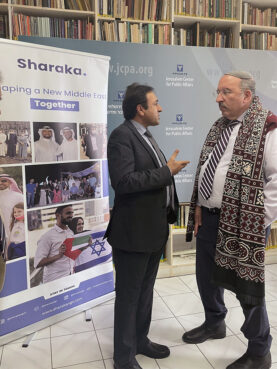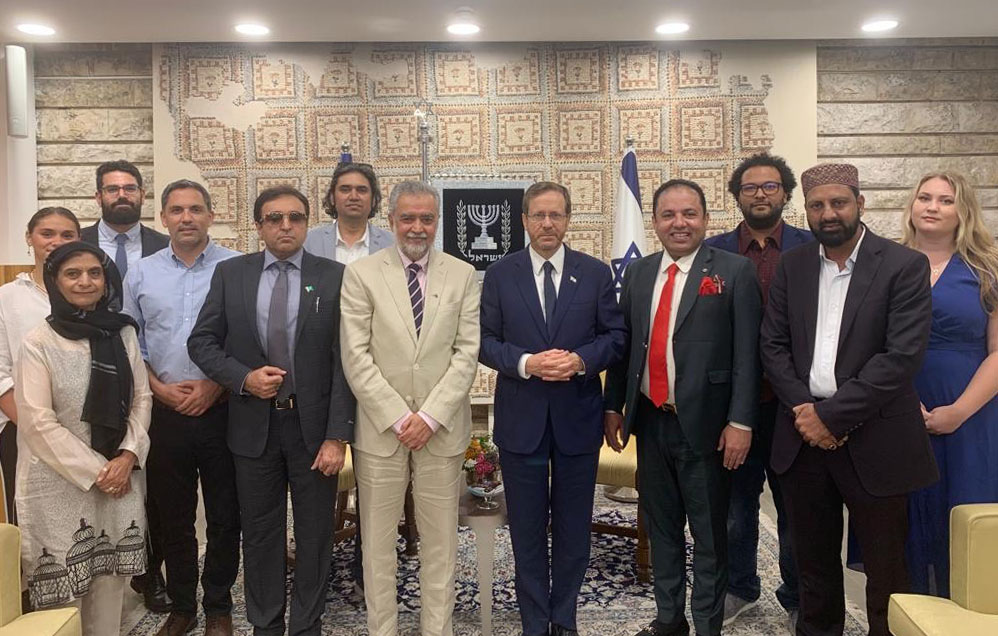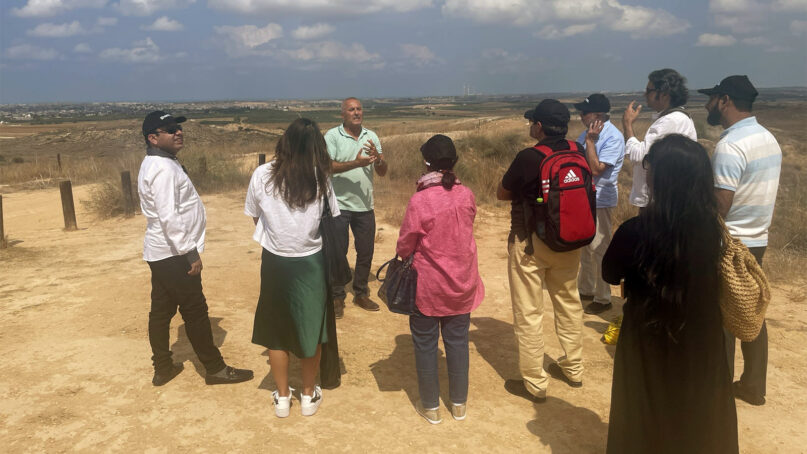JERUSALEM (RNS) — On a playground near the Gaza border where colorful bomb shelters surround the swings and slides, a group of Pakistanis put hard questions to a retired Israel Defense Forces colonel, asking about Hamas, Palestinians and whether the state of Israel is complicit in the suffering on both sides of the border.
The Pakistani visitors’ passports all include a statement in bolded letters saying they are valid for all countries in the world but Israel; this unofficial delegation was in Israel in part to see if it could change that. (The Pakistanis entered Israel via third countries, with the help of the Israeli Foreign Ministry.)
The six Pakistanis had traveled to Israel in late September under the auspices of Sharaka, a nongovernmental organization that promotes peace in the region, and the American Muslim & Multifaith Women’s Empowerment Council, whose co-founder and president, Anila Ali, traveled to Israel earlier this year. The Pakistani delegation included Nasim Ashraf, a minister of human development in former President Pervez Musharraf’s government, and Imtiaz Mir, a prominent Pakistani journalist. I went along at the invitation of Sharaka and the council to observe.
During their visit, they met with Israeli President Isaac Herzog; the former permanent representative of Israel to the United Nations, Dore Gold; members from the Israeli Foreign Ministry; and other geopolitical, faith and industry leaders.
RELATED: With fashion shows and internships, Muslim women calm tensions with police and FBI
The Pakistanis, as their passports suggested, took some risk in visiting Israel. Ali’s visit to Jerusalem in May sparked controversy in Pakistan, and a television journalist on the trip, Ahmed Quraishi, was fired after he visited with the Israeli president. Many spokespeople and politicians proposed that Ali and others on the trip lose their Pakistani citizenship.

Faiz Brohi, left, CEO of Awaz TV, a Pakistan news program, speaks with Ambassador Dore Gold in late September 2022, during an unofficial Pakistani delegation visit to Israel. Photo by BeLynn Hollers
This delegation arrived in Israel just days after the second anniversary of the Abraham Accords, the historic normalization deals between Israel and the United Arab Emirates and Bahrain. Pakistan was not part of the deal, something the two sponsoring organizations of the trip hope will change through interfaith visits like this one.
“I think diplomacy is the way to bridge divides and build that human connection that we have all forgotten about,” Ali said. “When it comes from the grassroots, it makes it easier for politicians to make difficult decisions.”
Ashraf said he joined the trip in an effort to weaken “demonization” of Israelis from his country. To do so, it needed to be public.
“That’s kind of human nature. So the more we interact, the more we meet with each other, talk to each other and understand with an open mind and open heart. I think that significantly reduces the conflict and leads to a solution,” Ashraf told me.
He hopes as many Muslim countries as possible will sign the accords.
On the first day of the trip, the delegation visited the Gaza border to see for themselves the unique challenges of the residents there. One delegate said nothing they had seen made a more powerful statement than the playground with a bomb shelter painted like a caterpillar.
While sitting in a playground, the group began to discuss the Palestine conflict.
“This is a conflict between Israel and Palestine. This is not a conflict between the Jews and Muslims,” Mir said to the retired colonel, bringing up a central theme of the week’s trip.
Nonetheless, Sharaka hopes to use interfaith understanding to help dissolve the separation that the political division creates.
“The Abraham Accords show us that we need new ways to approach old problems, and that we can solve so much more together than we can by not speaking to each other,” said Sharaka’s co-founder and CEO, Amit Deri.
That separation was driven home as the group arrived in the Old City of Jerusalem. The delegates and some of their Israeli companions were given an elaborate tour of the city by a Muslim guide who led them along the processional of the Via Dolorosa, the path Jesus was said to have taken with his cross to his crucifixion.
But as the group approached the al-Haram al-Sharif, or Temple Mount, which houses the Dome of the Rock mosque — marking the place where the Prophet Muhammad is said to have ascended to heaven — the Pakistanis were separated from their Jewish counterparts. Only Muslims are permitted on the mosque’s plaza.
I watched as the Muslim guide took them on ahead. When they reunited with their hosts, the Pakistanis’ eyes seemed widened. A change in the overall dynamic of the group could be felt, as if that visit marked the moment that site became holy for them in reality.

President of Israel Isaac Herzog, center right, welcomes a Pakistani delegation at the President’s House, known in Hebrew as Beit HaNassi, in Jerusalem in late September 2022. Photo courtesy of the Office of the President
Ashraf described the visits to the holy sites as “extremely powerful, it was really something that, you know, hit you deep inside.” Some of the delegates told me they never thought they would see these sites because of the lack of diplomatic ties.
Mir noticed, he said, that he was treated differently in the different quarters of the Old City.
“I watched, I observed resistance in our Muslim brothers,” he said. Mir added that some even asked where he was from. “There was resistance. There was hatred. When I visited the Jewish Quarter, there was peace, there was satisfaction.”
The group ended the day beneath the Western Wall, where, like most of the city, the competing narratives are made palpable. It is the historic site of the First and Second Temples of Jerusalem, where archaeological evidence continues to confirm historical accounts. But when in the late 1990s, Israel conducted excavations underneath the Muslim quarter of the city, which includes the Western Wall, the project set off a series of riots that killed both Israelis and Palestinians.
In Jaffa, the delegation was taken to the home of Ihab Balha, a Muslim peace activist who founded an interfaith Hebrew and Arab elementary school with his Jewish wife, Ora Balha.
After the group enjoyed a home-cooked meal, Ora Balha explained that she had been told from a very young age that Jews were the “chosen people.”
“I grew up with a lot of ignorance about that, because we’re not the chosen people. All people who are born are chosen to be born in this world,” she said.
RELATED: Why I oppose the Abraham Accords
Her husband talked about his own prejudices growing up, and how difficult it was when he fell in love with a Jewish woman. Their story was what propelled the couple to work for coexistence and peace.
The Balhas’ story of tension and social risk was not lost on the Muslim visitors from Pakistan, a point Dan Feferman, Sharaka’s director of communications and global affairs, acknowledged. They were “willing to take risk to their reputations and jobs and step up in the name of peace,” he said, assuring me that “their very presence here, and that many were journalists or public figures, was on its own impactful.”
(BeLynn Hollers is an editorial fellow for The Dallas Morning News editorial board through Intercollegiate Studies Institute. The views expressed in this commentary do not necessarily reflect those of Religion News Service.)





